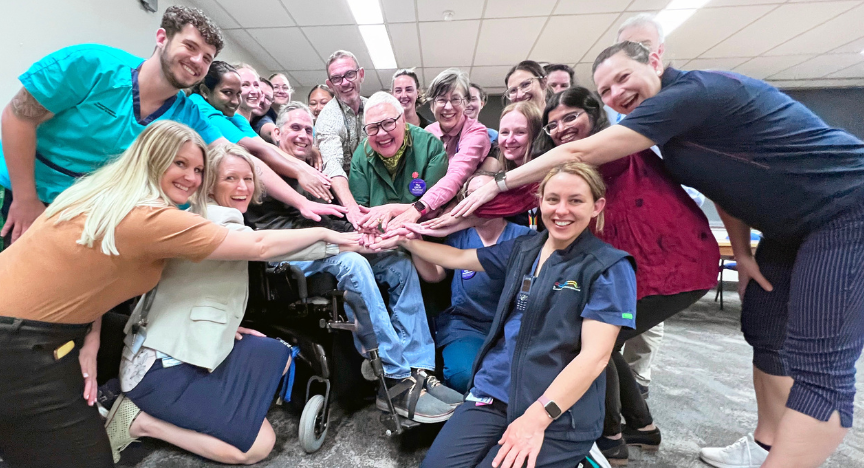
There’s a revolution happening in Queensland Spinal Cord Injuries Service (QSCIS) and the staff, consumer representatives and stakeholders are pushing the agenda with compassion at the core.
The dynamic group of 20 representatives, including 7 people living with spinal cord injury (SCI) and staff from all parts of the service based at PAH has been busy co-designing a framework for delivering the beautiful culture that is the foundation of care for patients with spinal cord injury.
Aptly titled ‘The QSCIS Backbone’, the draft document outlines the shared commitment to this vision.
Compassion Revolution leader, Mary Freer says the project group has designed shared values and behaviours to enhance care for all patients with SCI and that starts with truly understanding trauma-informed care and valuing lived experience.
“Great change always comes out of deeply understanding what our values and behaviours are, and then being able to demonstrate those good behaviours,” she said.
“All of our behaviours and responses are informed by the experiences that we've had throughout our lives. Trauma has different triggers for different people, and so often our behaviours are not intended to be harmful, but they are.
“Understanding what is influencing people and their behaviour when they are triggered or in a mindset of threat is key, because the automatic responses to trauma or threat from the brain take over resulting in behaviours that are often unexplainable. Trauma is something that happens to you, not something that’s wrong with you.”
The team have adopted the metaphor of the backbone as a representation of the framework. Our backbone provides strength and flexibility and signifies integrity and courage. The QSCIS Backbone draft is made up of five value statements and each of these values are tied to a set of clear behaviours. They are not rigid rules they have flexibility and life and will provide strength to the delivery of the service.
We are collaborative; we are compassionate; we are optimistic and hopeful; we are respectful; and we are intentional.
Spinal Injuries Unit Specialist Dr Claire Panagoda said that culture is built on agreed values that are backed up with great behaviours.
“We’re hoping there will be other opportunities across Rehabilitation and across the hospital to translate and implement some of these principles around culture enhancement, but also trauma-informed care,” added Dr Claire Panagoda.
Here is Mary’s top tip for helping people or providing trauma-informed care:
“What do you need right now? is a really good question to ask people, and ourselves, when the nervous system is activated, and sometimes the answer is really simple so we can help people move away from threat,” explained Mary. “It’s not a magic solution, but the question is helpful, not harmful.”
QSCIS project lead Kiley Pershouse said the Compassion Revolution has driven appreciation for each other.
“A lot of what we’ve been talking about when Mary has visited the service is how valuable our people are – they are our best assets and this work really celebrates that.”
The Division of Allied Health and Rehabilitation at PAH would like to celebrate the invaluable contribution of the consumer representatives on the co-design group and reinforce their thanks to the QSCIS team for the amazing work they do.
The draft document is open for feedback from stakeholders across the service with input due Friday 4 October 5pm. Read more about the draft and have your say here.